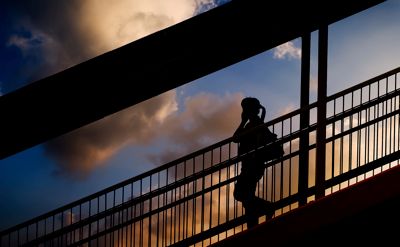A magazine where the digital world meets the real world.
On the web
- Home
- Browse by date
- Browse by topic
- Enter the maze
- Follow our blog
- Follow us on Twitter
- Resources for teachers
- Subscribe
In print
What is cs4fn?
- About us
- Contact us
- Partners
- Privacy and cookies
- Copyright and contributions
- Links to other fun sites
- Complete our questionnaire, give us feedback
Search:
Where's my signal?
We've all experienced the terror which comes with losing signal on your mobile phone: losing the ability to make texts, calls and, most importantly of all, our precious Internet. We walk around: inside, outside, eyes glued to the top of the screen desperately hoping for the bars to appear so that our lives can continue once more. Soon desperation and panic turns to frustration. Desperate attempts to call the network operator are made, before we realize we don't have signal. What's the problem? Queen Mary student Bapanna Bhamidimarri explains.

The reality is cities are the hardest places to make sure coverage is universal. Compared with rural areas where the main reason for bad coverage is the lack of towers, cities are crowded and complicated, with huge differences in the obstacles blocking the path of the signal: the glass and steel of the cities have completely different properties to the houses in the suburbs. Because of the problems, everything engineers and architects do to make sure we can all use our phones in cities is a compromise between cost, the area of coverage and the signal strength in that area. Their aim is that you should be getting bars on your phone and the nightmare situation shouldn't happen.
The more bars you see on your phone, the more signal it receives. However, more bars don't always mean more useful signal. Anywhere from a lot to a little of it will be noise - signal that carries no data. This noise can come from all sorts of places: other phone towers, TV masts, even outer space. All these other signals interfere with the one traveling directly between the phone and the tower through an effect called 'superpositioning'. This is when waves 'add up' or 'cancel each other'. Imagine two people making waves along a bed sheet. When two big waves meet each other an even bigger wave is created, but when two meet that are out of step - one going up as the other goes down - they cancel and a flat area is formed. If this happens to even a short part of a mobile signal, that data will be corrupted and unreadable. The phone will still show bars though as it will still be picking up something from the tower.
As well as interference to the original signal, mobiles pick up duplicate signals all the time too. This is because city environments tend to have surfaces that reflect and scatter signals (glass, water, steel and so on). Those reflected signals take a longer route so are received by the phone later than the original. This again causes superposition. It also means the phone has to put effort into working out which is the original and which the duplicate signal. If it can't, then calls will be dropped and texts either won't be received or be received more than once. Because these signals also come from the tower, the phone sees them as signs of a strong signal - so even though the actual usable signal might be low, the number of bars will be high.
One thing that would help is to boost the power of the base station and the phone, so that the signals they send are stronger. However, there is an ongoing debate over whether the radiation used by mobile phones could be causing cancers or other health problems - the World Health Organization has classified them as possibly cancer causing though the jury is still out. As a result limits have also been placed on the maximum power the signals being broadcast by a phone can have. On the other hand, the large studies that have been done have found that there are no health problems caused by using mobiles even over many years. More research needs to be done before we know for sure what the risk really is.
The mobile phone industry is spending huge amounts of money trying to solve the problem of bad signal in cities, but the solution unfortunately isn't simple. There's probably only so much that can be done in the pursuit of more bars - and even then it may not guarantee a good signal. So that leaves a challenge for would be electronic engineers! The only thing that the poor signal-less mobile phone owner can do for now, though, is to hope to get lucky with a nearby tower, or failing that, rely on the good old landline.


